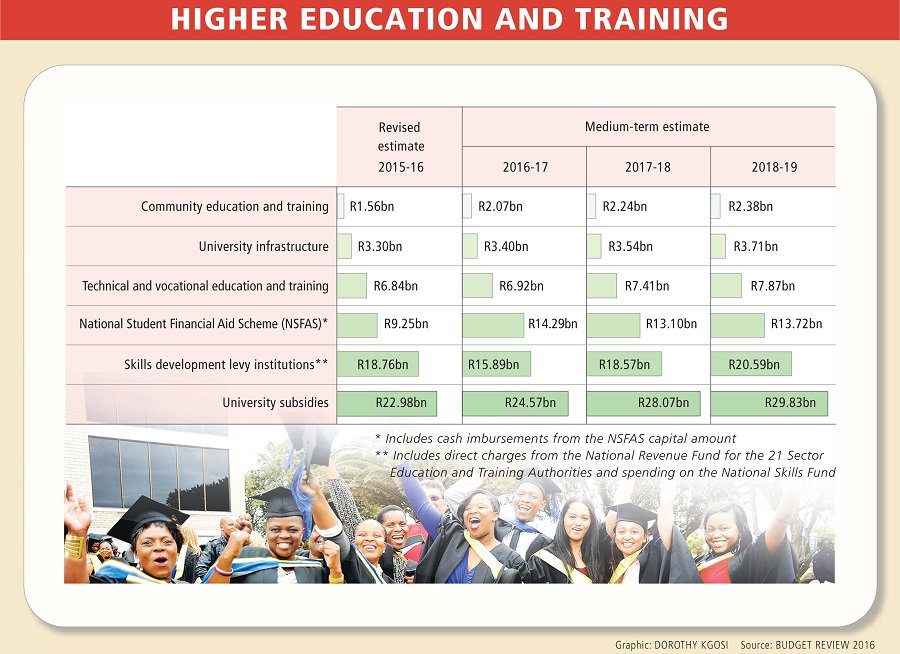EDUCATION: Students benefit from tightening elsewhere
by Tamar Kahn and Karl Gernetzky,
2016-02-25 06:10:33.0
THE Treasury has allocated an extra R16.3bn to higher education over the medium term, to compensate for the government’s undertaking to students that fees would be frozen this year and to support the National Student Financial Aid Scheme (NSFAS).
The extra money has come from "stringent cost containment measures" in other departments, including compensation budgets and nonessential services, the Treasury said.
A total of R5.7bn will be used to address the shortfall created by keeping university fees at 2015 levels this year, and the carry-through costs over the medium term.
NSFAS gets R2.5bn to clear the outstanding debt that 71,753 students owe to universities for the 2013-15 academic years, along with a further R8bn over the medium term to enable current students to complete their studies.
"We are crafting solutions to the voices of students regarding fees and housing. I need to emphasise that violent protest is not an acceptable way of articulating these challenges," Finance Minister Pravin Gordhan said in his budget speech to Parliament.
Work is under way to determine the feasibility of free higher education and training, spearheaded by a presidential inquiry due to report by the end of October. An interdepartmental task team chaired by the Treasury is also investigating the financing options for the White Paper for post-school education and training.
The Treasury estimates the higher education budget will increase by 7.9% over the medium-term expenditure framework, from R68.7bn in 2016-17, to R74.7bn in 2017-18 and R80.5bn in 2018-19. Of these funds, R36.8% is allocated to university subsidies.
The dean of the faculty of humanities at the University of the Witwatersrand, Prof Ruksana Osman, noted the emphasis on the linkages between the spheres of education, and said that it had been "leaking" over the years.
"Interestingly, this time around, I think there is an acknowledgment of the importance of the pipeline from early childhood to basic education and higher education," she said.
"I get the sense there is a real acknowledgment of this continuum and a need to strengthen the pipeline."
Beyond the general theme of a need for strengthening social contracts and societal coalitions, the budget’s emphasis on higher education was well placed, Prof Osman said.
Basic education gets 17.6% of the government’s expenditure, and its allocation will grow by 7.4% over the next three years.
The basic education budget allocation increases from R204.3bn this year to R218.8bn in the fiscal year 2016-17, and then to R234.7bn in 2017-18.
Growth in the basic education budget is driven primarily by last year’s wage agreement with public servants.
The compensation of employees takes nearly three-quarters of the funds (73.9%) allocated over the medium term, and its share of the budget grows by 8.2% over the period.
Compensation for employees increases from R154.9bn in the current fiscal year, to R197.1bn by 2018-19.
A new early childhood development (ECD) grant has been created, and an additional R813m allocated over the medium term to implement the Cabinet-approved ECD strategy.
These funds will be used to assist about 104,000 poor children and about 4,000 ECD centres across the country.

Picture: THINKSTOCK
THE Treasury has allocated an extra R16.3bn to higher education over the medium term, to compensate for the government’s undertaking to students that fees would be frozen this year and to support the National Student Financial Aid Scheme (NSFAS).
The extra money has come from "stringent cost containment measures" in other departments, including compensation budgets and nonessential services, the Treasury said.
A total of R5.7bn will be used to address the shortfall created by keeping university fees at 2015 levels this year, and the carry-through costs over the medium term.
NSFAS gets R2.5bn to clear the outstanding debt that 71,753 students owe to universities for the 2013-15 academic years, along with a further R8bn over the medium term to enable current students to complete their studies.
"We are crafting solutions to the voices of students regarding fees and housing. I need to emphasise that violent protest is not an acceptable way of articulating these challenges," Finance Minister Pravin Gordhan said in his budget speech to Parliament.
Work is under way to determine the feasibility of free higher education and training, spearheaded by a presidential inquiry due to report by the end of October. An interdepartmental task team chaired by the Treasury is also investigating the financing options for the White Paper for post-school education and training.
The Treasury estimates the higher education budget will increase by 7.9% over the medium-term expenditure framework, from R68.7bn in 2016-17, to R74.7bn in 2017-18 and R80.5bn in 2018-19. Of these funds, R36.8% is allocated to university subsidies.
The dean of the faculty of humanities at the University of the Witwatersrand, Prof Ruksana Osman, noted the emphasis on the linkages between the spheres of education, and said that it had been "leaking" over the years.
"Interestingly, this time around, I think there is an acknowledgment of the importance of the pipeline from early childhood to basic education and higher education," she said.
"I get the sense there is a real acknowledgment of this continuum and a need to strengthen the pipeline."
Beyond the general theme of a need for strengthening social contracts and societal coalitions, the budget’s emphasis on higher education was well placed, Prof Osman said.
Basic education gets 17.6% of the government’s expenditure, and its allocation will grow by 7.4% over the next three years.
The basic education budget allocation increases from R204.3bn this year to R218.8bn in the fiscal year 2016-17, and then to R234.7bn in 2017-18.
Growth in the basic education budget is driven primarily by last year’s wage agreement with public servants.
The compensation of employees takes nearly three-quarters of the funds (73.9%) allocated over the medium term, and its share of the budget grows by 8.2% over the period.
Compensation for employees increases from R154.9bn in the current fiscal year, to R197.1bn by 2018-19.
A new early childhood development (ECD) grant has been created, and an additional R813m allocated over the medium term to implement the Cabinet-approved ECD strategy.
These funds will be used to assist about 104,000 poor children and about 4,000 ECD centres across the country.














 News, views and analysis of Finance Minister Pravin Gordhan's 2016 budget
News, views and analysis of Finance Minister Pravin Gordhan's 2016 budget






Change: -0.47%
Change: -0.57%
Change: -1.76%
Change: -0.34%
Change: 0.02%
Data supplied by Profile Data
Change: -1.49%
Change: 0.08%
Change: -0.47%
Change: 0.00%
Change: -0.04%
Data supplied by Profile Data
Change: -0.34%
Change: 0.03%
Change: -0.10%
Change: -0.22%
Change: -0.81%
Data supplied by Profile Data
Change: -0.28%
Change: -1.15%
Change: -0.07%
Change: -1.21%
Change: -0.22%
Data supplied by Profile Data